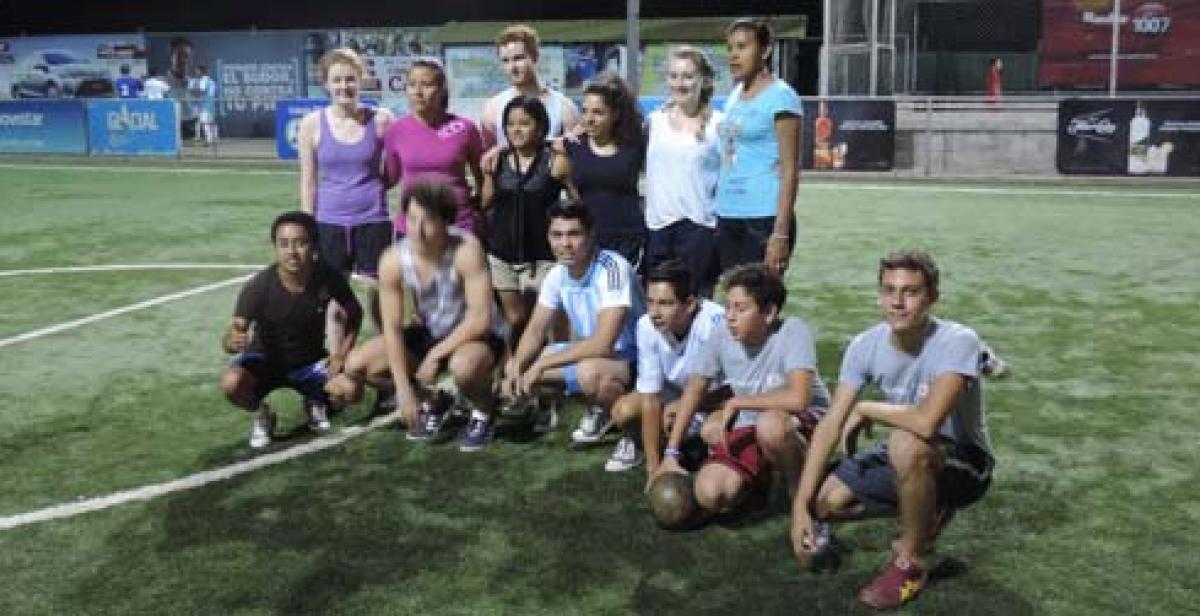Coming to Nicaragua with little to no Spanish was maybe not the best of ideas, especially as a Team Leader, where communication with the members of your team and with those organising the projects is so important. One would assume that language will be the main way of communicating and building relationships. Clearly communication with the UK volunteers through language was going to be much easier but we all needed to build relationships with the national volunteers, and some of us would have to do this without language.
I spent my first week in Nicaragua with Spanish speakers. Some could of course speak English and some to a very high standard. I spent the weekend with my host family and over the course of the weekend the communication improved, with a lot of use of the dictionary and realising that making jokes and communication without language really does work. I taught my host sister an English tongue twister and she taught me a Spanish one.
She sells sea shells on the sea shore but the shells that she sells are not sea shells I am sure.
¿Pablito clavo un clavito donde Pablito clavo el clavito?
After a weekend of little speaking I think I overwhelmed the other UK volunteers who arrived from their 16 hour flight. They were all exhausted while I was excited at the prospect of being able to speak English to English speakers. After my babbling and torrent of conversation on the journey from the airport to the hotel they were all even more tired than when they had got off the plane!
The next morning, once everyone had rested and had their first taste of gallo pinto, the UK volunteers met the rest of the Progressio Nicaragua team and we did a few bits of administration. We also got to learn a bit about the culture and the history of Nicaragua by going to the museum in Managua. Relationships among the UK volunteers developed, and not just through conversations but mostly through laughter and shared faces of confusion/boredom/amusement from the discussions and artefacts at the museum. It wasn’t until the next day that we would get to meet our Nicaraguan counterparts.
Wednesday morning involved more gallo pinto and a pink drink for breakfast that no one could quite work out what it was. Then the apprehension of waiting for the Nicaraguan volunteers to arrive. There were a few Spanish speakers among the group of UK volunteers but everyone was still nervous about how were we going to communicate. How would we be able to work together without language?
We began with games to learn each other’s names. This involved having to name either the person to your right, left or say your own name depending on what Spanish colour was said. It was definitely a good way to learn names and see who was paying attention. Then we played a game where you had to react if the person next to you got ‘shot’ and which hand to put up depending on which side of you they were on. The punishment for getting it wrong was having a blob of pen drawn on your face. Trying to hint to someone that they’ve done the wrong thing or groans when everyone had to get a blob on the face didn’t require language to understand each other. Slowly we began to feel more at ease with each other and learn the important words in Spanish like tired, hungry and hot (this one we used a lot!) The afternoon involved dancing and organising people into height order, and eye colour without speaking. This just proved to us how language isn’t the only way to communicate with each other and that you can learn a lot about people without it.
We played basketball and football in the evening. As always boys were able to bond over the football teams they support. Playing football and basketball on the same court and pretty much in the dark meant warnings for flying balls or people were any combination of noises or words so to get someone’s attention. Competitiveness is also easily communicated without language. After a few good games and a few not so good injuries we headed off to bed, ready to make our team logo, including a name and slogan the next day.
Designing a team logo proved a little more difficult without language. Very quickly ideas about ants or bugs working together were suggested as the idea was that together we can do more than working individually. Everyone seemed keen on this so ‘Hormigants’ became the name of our team, combining the Spanish for Ants which is Hormigas and the English word ‘Ants’ itself. After various sketches and combining people’s different ideas through gestures, pointing, and motioning to show agreement or disagreement, we decided on the logo all together. Our logo showed a Nicaraguan ant and a UK ant working together. Everyone knew without a need for labelling which was the UK ant as it was the one with blue eyes. Our slogan is ‘la unión hace la fuerza’.
Our orientation week finished with a football match. Los Pasos Internacionales versus Hormigants. Of course Hormigants won. It was a great way to finish the orientation week. Bonds had been formed and relationships created based on a few words of communication but much more without language. Jokes can be understood without words and the important words such as tiredness, hungriness and being hot had already been learnt.
Now we are off to Masaya to meet our host families. With confidence in our communication skills without language we were ready to continue working together on the project and to build stronger relationships with each other, and hopefully learn some more Spanish!
Written by ICS Group Leader Eliza Ackland



